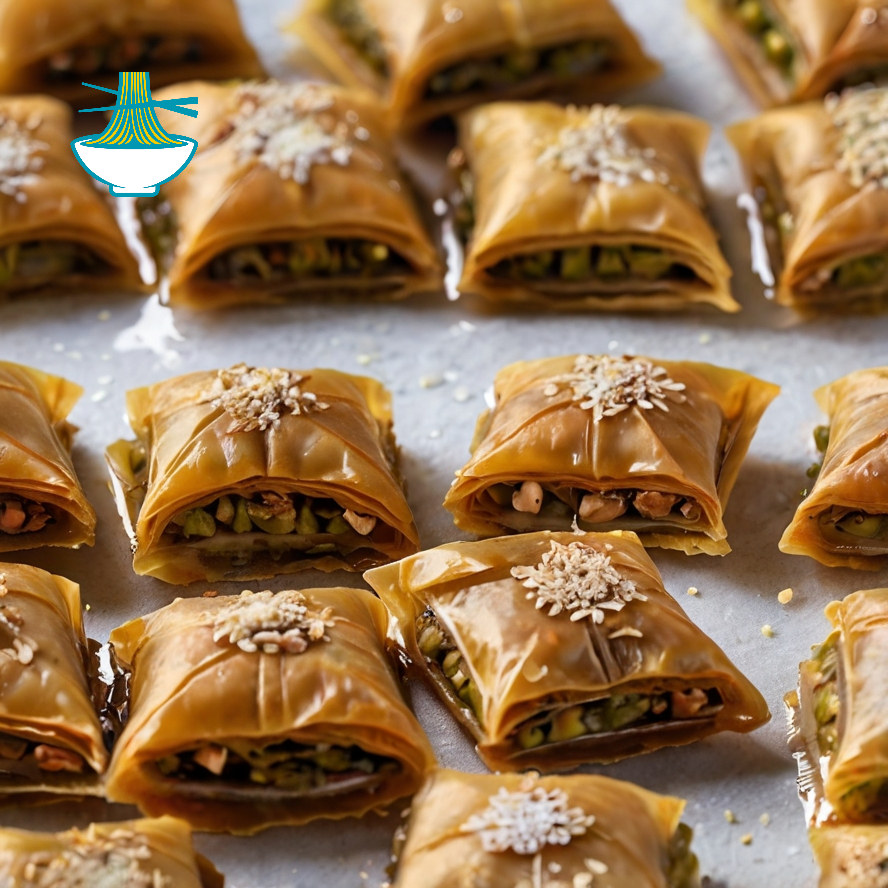Discover the traditional recipe for Baklava, a rich and sweet pastry made from layers of flaky filo dough, filled with a delicious mixture of nuts, and drizzled with sweet honey syrup. Perfect for any special occasion or as a delightful dessert, this Baklava recipe will guide you step by step to create a mouthwatering treat that everyone will love. Try it today and enjoy the authentic taste of this classic Mediterranean dessert.
Ingredients:
- 1 package filo dough (16 oz)
- 2 cups mixed nuts (walnuts, pistachios, or almonds), finely chopped
- 1 cup unsalted butter, melted
- 1 teaspoon ground cinnamon
- 1 cup honey
- 1 cup sugar
- 1/2 cup water
- 1 teaspoon vanilla extract
- 1 teaspoon lemon juice
Instructions:
Preheat the Oven: Preheat your oven to 350°F (175°C).
Prepare the Nut Filling: In a bowl, mix the finely chopped nuts with ground cinnamon. Set aside.
Layer the Filo Dough: Brush a 9x13 inch baking dish with melted butter. Lay one sheet of filo dough in the dish and brush it with butter. Repeat the process for about 8 sheets, making sure each one is buttered.
Add the Nut Mixture: Sprinkle a thin layer of the nut mixture over the filo dough. Add another 5 sheets of filo, buttering each layer. Repeat the process until all the nuts and dough are used, finishing with a layer of filo on top.
Cut the Baklava: Using a sharp knife, cut the baklava into diamond or square shapes.
Bake: Place the dish in the preheated oven and bake for 45-50 minutes or until the baklava is golden and crisp.
Prepare the Honey Syrup: While the baklava is baking, combine honey, sugar, water, vanilla extract, and lemon juice in a saucepan. Bring to a boil, then reduce the heat and let it simmer for 10 minutes.
Add the Syrup: Remove the baklava from the oven and immediately pour the honey syrup evenly over the hot baklava. Allow it to soak in and cool completely.
Serve: Once cooled, serve the baklava in individual pieces. Enjoy this sweet, nutty dessert with a cup of tea or coffee!
Nutritional Values
Filo Dough (1 package, 16 oz)
- Calories: Approximately 800-1000 (for the whole package)
- Carbohydrates: 100-120 g
- Protein: 8-10 g
- Fat: 40-50 g
Benefits:
- Texture: Provides a crisp and flaky texture to baked goods and desserts.
- Versatility: Used as a base for various sweet and savory dishes.
Mixed Nuts (2 cups, finely chopped; walnuts, pistachios, or almonds)
- Calories: Approximately 1200-1600
- Protein: 25-30 g
- Fat: 100-120 g (mostly healthy fats)
- Carbohydrates: 40-50 g
- Fiber: 12-15 g
Benefits:
- Healthy Fats: Rich in unsaturated fats, which support heart health.
- Protein: Provides a good source of plant-based protein.
- Nutrients: Contains vitamins and minerals like vitamin E, magnesium, and antioxidants.
Unsalted Butter (1 cup, melted)
- Calories: Approximately 810
- Fat: 92 g (including saturated fat)
- Protein: 1 g
- Carbohydrates: 0 g
Benefits:
- Flavor: Adds rich, creamy flavor and improves the texture of baked goods.
- Baking: Essential for achieving a desirable texture in many recipes.
Ground Cinnamon (1 teaspoon)
- Calories: Approximately 6
- Carbohydrates: 2 g
Benefits:
- Antioxidants: Contains antioxidants that can help fight inflammation and improve health.
- Flavor: Adds a warm, sweet flavor to dishes and desserts.
Honey (1 cup)
- Calories: Approximately 640
- Carbohydrates: 175 g
- Protein: 0.5 g
- Fat: 0 g
Benefits:
- Natural Sweetener: Provides a natural source of sweetness with some trace vitamins and minerals.
- Antioxidants: Contains antioxidants that may help with health and immunity.
Sugar (1 cup)
- Calories: Approximately 775
- Carbohydrates: 200 g
- Protein: 0 g
- Fat: 0 g
Benefits:
- Sweetness: Adds sweetness to recipes and helps with texture and color in baking.
Water (1/2 cup)
- Calories: 0
Benefits:
- Moisture: Helps dissolve sugar and create a syrup-like consistency.
Vanilla Extract (1 teaspoon)
- Calories: Approximately 12
- Carbohydrates: 0 g
- Fat: 0 g
- Protein: 0 g
Benefits:
- Flavor: Adds a rich vanilla flavor to dishes and desserts.
- Aromatic: Enhances the overall aroma and taste of baked goods.
Lemon Juice (1 teaspoon)
- Calories: Approximately 3
- Carbohydrates: 1 g
- Vitamin C: 7 mg
Benefits:
- Flavor: Adds a tangy flavor that balances sweetness.
- Vitamin C: Provides a small amount of vitamin C, which supports immune function.
These ingredients combine to create a delicious and rich dessert with a balance of flavors and textures.


Comments